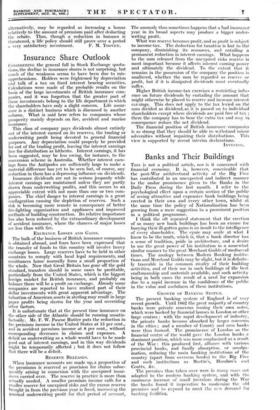EXCHANGE LOSSES AND GAINS.
The bulk of the business of British insurance companies is obtained abroad, and fears have been expressed that the transfer of funds to this country will involve heavy exchange losses. Large reserves have to be held in other countries to comply with local legal requirements, and remittances home normally form a small proportion of the whole. Now that Great Britain has gone off the gold standard, transfers should in some cases be profitable, particularly from the United States, which is the biggest foreign_ market for British insurance, and probably on balance there will be a profit on exchange. Already some companies are reported to have realized part of their dollar investments with great apparent advantage. The valuation of American assets in sterling may result in large paper profits being shown for the year and overriding other factors.
It is unfortunate that at the present time insurance on the other side of the Atlantic should be running unsatis- factorily. Mr. F. W. Pascoe Rutter puts the reduction in fire premium income in the United States at 15 per cent., and in accident premium income at 8 per cent., without corresponding decreases in claims and expenses. A deficit on underwriting as a whole would have to be made good out of interest earnings, and in this way dividends might be temporarily affected ; but it does not follow that there will be a deficit.






































 Previous page
Previous page